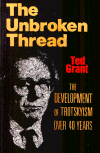Book Review: ‘The Unbroken Thread’, by Ted Grant
Militant Non-Marxist
 The Unbroken Thread, the Development of Trotskyism over 40 Years. By Ted Grant, Fortress Books, London, 1989. £6.95.
The Unbroken Thread, the Development of Trotskyism over 40 Years. By Ted Grant, Fortress Books, London, 1989. £6.95.
This is a collection of some of the principal writings of Ted Grant, the founder of the “Revolutionary Socialist League” (more popularly known as “Militant”). The Introduction argues that in the decades since the Second World War:
“Grant has defended the method of Marxism against all kinds of alien ideas. What makes this achievement all the more remarkable is that this has been a period, for the most part, of economic upswing and political reaction … it is to one person alone that the credit must go for the maintenance and development of Marxist theory in this most difficult period.”
This is the stuff of which legends are made, and there can be no bigger fairytale than that Grant’s brand of orthodox Trotskyism has been the main bulwark against ideas “alien” to Marxism. Grant has not been single-handedly slaying the capitalist dragon in the name of Marxism. On the contrary, he is part of a political tradition that has systematically abandoned the central positions of Marxism in favour of Leninist notions about vanguards, the “transitional society”, and the “workers’ state”. What is more, Grant has some harsh things to say about the one Marxist organisation in Britain which has refused to follow the Leninist distortion:
“If all that was required of revolutionaries was to repeat ad nauseam a few phrases and slogans taken from the great teachers of Marxism, the problem of the revolution would be simple indeed. The SPGB would be super-Marxists instead of incurable sectarians. As Trotsky remarked of the ultra-lefts, every sectarian would be a master strategist.”
Of course, the Socialist Party does not need lessons in strategy from an organisation whose members on Liverpool City Council were responsible for the issuing of 30,000 redundancy notices to local government workers a few years ago, and our crime of “sectarianism” has simply been our refusal to compromise with political parties who insist, against all the evidence, that they can operate capitalism in the interest of the working class.
As much of this book is preoccupied with analysing the failure of Labour’s “gradualist” approach when in office, readers will be able to judge for themselves who has adopted the correct position when it comes to the promises of reformist movements. Grant argues that his favoured medicine of nationalisation hasn’t worked because the dose wasn’t large enough and that it should have been repeated more often, but as the workers in Eastern Europe are currently showing, that is not an argument likely to convince many.
The Nature of the USSR
The only part of this book really worth reading is Grant’s essay “Against the Theory of State Capitalism”, originally written in 1949, which is a critique of the position developed by Tony Cliff and now held by the Socialist Workers Party that Russia has been state capitalist since 1928. Grant’s primary aim is to defend Trotsky’s argument that Russia was a “workers’ state” that had degenerated under the political control of privileged party bureaucrats. Despite the deficiency of this analysis (a “workers’ state” being a contradiction in terms) Grant is able to deal quite effectively with Cliff’s assertion that capitalism was restored in Russia in 1928 with Stalin’s first Five Year Plan. He argues that Cliff’s distinction between pre-1928 and post-1928 Russia is completely arbitrary as all the conditions for state capitalism laid down by Cliff were present in the pre-1928 period:
“If Comrade Cliff’s thesis is correct, that state capitalism exists in Russia today, then he cannot avoid the conclusion that state capitalism has been in existence since the Russian Revolution and the function of the revolution itself was to introduce this state capitalist system of society. For despite his tortuous efforts to draw a line between the economic basis of Russian society before 1928 and after, the economic basis of Russian society has in fact remained unchanged . . . money, labour power, the existence of the working class, surplus value, etc, are all survivals of the old capitalist system earned over even under the regime of Lenin … the law of value applies and must apply until there is direct access to the products by the producers.”
It only needs to be added that in Britain it was the Socialist Party that developed a Marxist analysis of Russia, recognising it as a country in which class monopoly of the means of production, together with wage labour, capital accumulation and other basic features of capitalism, have existed continuously since the Bolshevik seizure of power in 1917.
